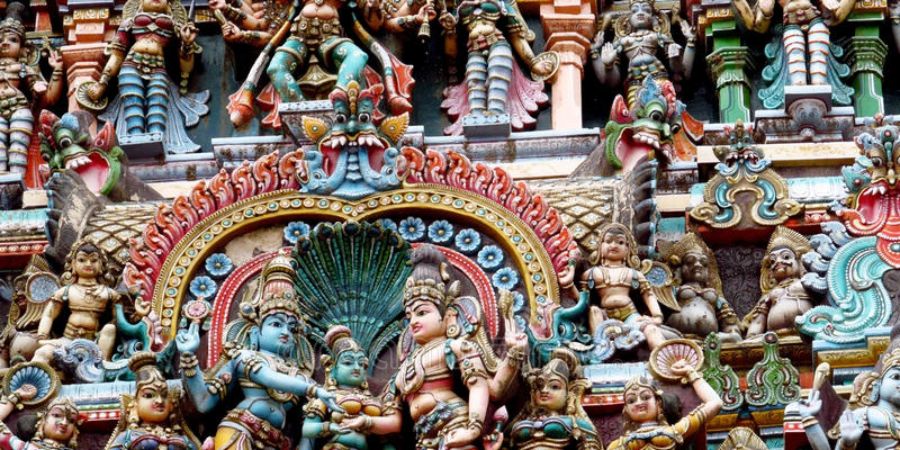

To educate students about the diversity of religions in the United States and around the world, pair this introduction with the lesson The World's Religions.
Hinduism is regarded as the third-largest religion in the world and has one billion adherents. It may be dated back to as early as 10,000 B.C. Hinduism comprises Indian religious, philosophical, and cultural concepts and customs.
Hindus hold that there is only one supreme being known as "Brahman," and that thousands of Hindu gods and goddesses serve as representations of Brahman in all of its facets. Hindus also hold to the notions of reincarnation (also known as rebirth), the law of cause and effect, and the significance of continuing down the righteous path. The Bhagavad Gita, the Upanishads, and the epics are the three most widely read sacred Hindu writings.
Depending on the lunar cycle, the time of year is either October or November. The beginning of the Hindu New Year is commemorated during this five-day celebration. The celebrations, often referred to as the "Festival of Lights," include candles, miniature clay lamps, and fireworks. These lights stand for the triumph of light over darkness and good over evil.
Actually, Lord Rama and his wife Sita are honoured by the festival of Diwali because they returned to their home country of Ayodhya after Rama and the monkey god Hanuman killed the demon King Ravana and freed Sita from his grasp. Ganesha, the god who removes barriers, and Laxmi, the goddess of riches and prosperity, receive special blessings.
Depending on the lunar cycle, the time of year is either late August or early September. The 11-day Ganesh Chaturthi festival celebrates the birth of the elephant-headed Hindu divinity Lord Ganesha. On podiums and in residences, enormous statues of Ganesha are present. The statues are paraded through the streets and then dipped into the ocean at the festival's conclusion.
The Bhagavad Gita was referred to by Mahatma Gandhi as his "spiritual lexicon."
The Bhagavad Gita, which translates to "The Song of God" in Sanskrit, is a Hindu text with 701 verses that is a component of the Mahabharata saga. It is regarded as the most important holy text for Hinduism, the world's oldest religion.
The Pandava prince Arjuna faces a moral conundrum at the beginning of the epic battle between the Pandavas and the Kauravas contemplating the cost of the conflict on both sides. Lord Krishna responds to his request for counsel by talking on the moral, ethical, intellectual, and spiritual facets of Arjuna's concerns. The Bhagavad Gita has this exchange between Krishna and Arjuna, which goes well beyond their disagreements over how to fight.
The Bhagavad Gita is a treatise on Hindu principles of morality, devotion, and moksha, or liberation from ignorance.
I recently started reading a few pages of the Bhagavad Gita every night before bed, encouraged by my friend Shreya Badonia. It had an instantaneous impact on my mental condition. I felt more at ease and in control, as though I were more prepared to handle the rigours of life.
Although I haven't finished the book yet, I've compiled the six ideas that have affected me the most. I hope they open your eyes and give you new insight on how to reach your best potential.
